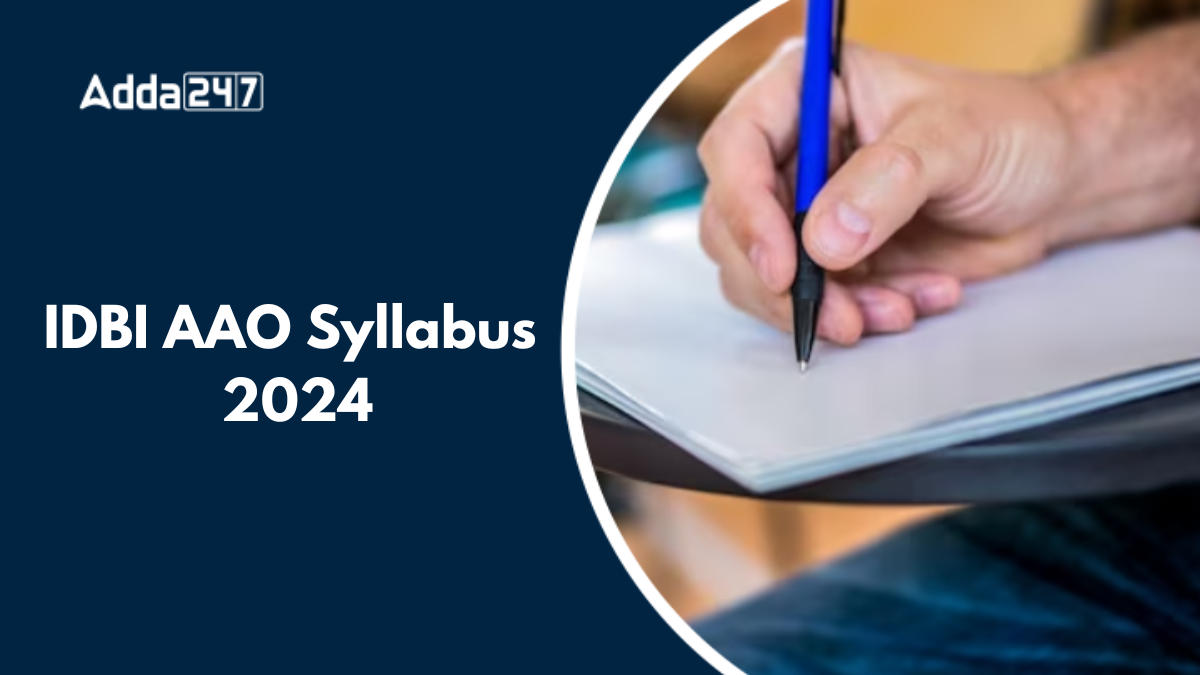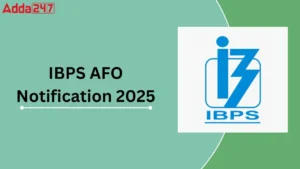The IDBI has released an official notification for the recruitment of 100 new aspirants for the position of IDBI AAO (Specialist-Agri Asset Officers) in 2024. The IDBI AAO syllabus will be crucial in guiding candidates to prepare effectively for the upcoming exam.
This article provides comprehensive details about the IDBI AAO Syllabus 2024 and the latest exam pattern. By understanding the syllabus, candidates can focus on the key topics and develop a strategic preparation plan, increasing their chances of success in the exam.
IDBI AAO Syllabus and Exam Pattern 2024
The IDBI AAO (Specialist-Agri Asset Officers) recruitment 2024 consists of four key stages through which aspirants will be selected. The selection process includes:
- Online Computer-Based Test
- Document Verification
- Personal Interview
- Medical Examination (as per pre-recruitment requirements)
To successfully navigate this recruitment process, it is essential for candidates to be fully aware of the IDBI AAO Syllabus 2024. Understanding the syllabus will allow candidates to prepare strategically for the exam.
Below is a summary of the syllabus and exam pattern for 2024:
IDBI AAO Exam Pattern
- Mode of Exam: Online (Computer-Based Test)
- Syllabus:
- Reasoning
- English Language
- Quantitative Aptitude
- General/Economy/Banking Awareness/Computer/IT
- Professional Knowledge
- Negative Marking: 0.25 marks will be deducted for each incorrect answer.
Candidates should ensure they are well-versed in these topics to perform well in the exam. Proper preparation with the right syllabus information is key to success in the IDBI AAO recruitment process.
| S.No | Name of the Test | No. of Questions | Maximum Marks | Time Allotted for Each Test (in minutes) |
|---|---|---|---|---|
| 1 | Logical Reasoning, Data Analysis & Interpretation | 60 | 60 | 40 |
| 2 | English Language | 40 | 40 | 20 |
| 3 | Quantitative Aptitude | 40 | 40 | 35 |
| 4 | General/Economy/Banking Awareness/Computer/IT | 60 | 60 | 25 |
| 5 | Professional Knowledge | 60 | 60 | 45 |
IDBI AAO Syllabus Topic Wise 2024
Below is a detailed breakdown of the IDBI AAO Syllabus 2024 based on the topics that will be covered in the online test. This will help aspirants get a clear understanding of each section and focus their preparation accordingly.
Logical Reasoning, Data Analysis & Interpretation
The IDBI AAO Syllabus for the Logical Reasoning, Data Analysis & Interpretation section is designed to assess candidates’ abilities in combining logical reasoning, numerical analysis, and pattern recognition. This section evaluates how effectively candidates can solve complex problems that require both analytical thinking and numerical precision. Key skills tested in this section include:
| Non-Verbal Reasoning | Verbal Reasoning |
|---|---|
| 1. Construction of Squares & Triangles | 1. Classification |
| 2. Analytical Reasoning | 2. Data Sufficiency |
| 3. Water Images | 3. Series Completion |
| 4. Forming Figures and Analysis | 4. Operations of Mathematics |
| 5. Series | 5. Venn Diagram |
| 6. Completion of Sentences | 6. Word Sequence |
| 7. Spotting Embedded Figures | 7. Missing Characters |
| 8. Classification | 8. Sequential Output Training |
| 9. Rule Detection | 9. Coding-Decoding |
| 10. Paper Cutting | 10. Directions |
| 11. Cubes & Dices | 11. Test on Alphabets |
| 12. Mirror Images | 12. Eligibility Test |
| 13. Dot Situation | 13. Alpha-Numeric Sequence Puzzle |
| 14. Identical Figure Groupings | 14. Arithmetical Reasoning |
| 15. Paper Folding | 15. Puzzle Test |
| 16. Figure Matrix | 16. Blood Relations |
| 17. Analogy | |
| 18. Verification of Truth of Statement | |
| 19. Situation Reaction Test | |
| 20. Direction Sense Test |
English Language
| S.No | Topic | Description |
|---|---|---|
| 1 | Cloze Test | Involves filling in the blanks within a passage using the correct words, testing vocabulary, grammar and context comprehension. |
| 2 | Reading Comprehension | Assesses the ability to understand, interpret and analyze a passage, followed by answering related questions. |
| 3 | Spotting Errors | Tests the ability to identify grammatical, syntactical, or contextual errors in a given sentence or passage. |
| 4 | Sentence Improvement | Focuses on improving a given sentence by replacing incorrect parts or making it more grammatically correct and contextually appropriate. |
| 5 | Sentence Correction | Involves correcting the errors in a sentence by selecting the right grammatical structure, punctuation, or vocabulary. |
| 6 | Para Jumbles | Requires arranging sentences in a logical order to form a coherent paragraph. |
| 7 | Fill in the Blanks | Involves completing a sentence or passage with the correct word or phrase to maintain grammatical correctness and logical flow. |
| 8 | Para/ Sentence Completion | Tests the ability to complete paragraphs or sentences in a meaningful way, usually by choosing the most contextually appropriate option. |
| 9 | Coherent Paragraph | Involves arranging sentences or parts of a paragraph logically to form a well-structured and coherent piece of writing. |
| 10 | Inferences | Tests the ability to understand implied meanings in a passage or sentence, going beyond the literal meaning of the text. |
| 11 | Starters | Involves selecting the appropriate opening sentence or phrase to begin a paragraph or passage. |
| 12 | Connectors | Focuses on choosing appropriate linking words or connectors to maintain the logical flow between ideas or sentences in a passage. |
| 13 | Column-Based Questions | Requires matching pairs of statements, usually between two columns, based on logical connections or contextual relationships. |
| 14 | Spelling Errors | Involves identifying and correcting spelling mistakes in a given set of words or sentences. |
| 15 | Word Re-arrangement | Tests the ability to rearrange words in a sentence or passage to form a grammatically correct and meaningful structure. |
| 16 | Idioms and Phrases | Assesses the understanding of common idiomatic expressions and phrases and their appropriate usage in sentences. |
| 17 | Word Usage | Tests the correct usage of words in a sentence, ensuring that the meaning and context align with the intended purpose. |
| 18 | Sentence-Based Errors | Involves identifying errors related to sentence construction, such as issues with grammar, punctuation or syntax. |
Quantitative Aptitude
| S.No | Topic | Description |
|---|---|---|
| 1 | Simplification and Approximation | Involves simplifying complex mathematical expressions and approximating values for quick calculations. |
| 2 | Number Series | Focuses on identifying patterns and solving missing number series or sequences. |
| 3 | Inequality | Tests the ability to solve problems related to relationships between quantities, such as “greater than” or “less than.” |
| 4 | Arithmetic | Covers topics like percentages, profit and loss, average, ratio and proportion, time and work etc. |
| 5 | Data Interpretation (DI) | Involves analyzing and interpreting data presented in the form of charts, graphs or tables. |
| 6 | Data Sufficiency (DS) | Tests the ability to determine if the provided data is sufficient to answer the given questions. |
| 7 | Other Important Topics | Includes topics like time-speed-distance, probability, partnership etc., which are often tested in various forms. |
General/Economy/Banking Awareness/Computer/IT
The IDBI AAO syllabus Would generally revolves around the day to day life feeds with which each aspirants should be aware of such as Latest feeds related to National and International, schemes launched by different Governing bodies along with their new provisions in various sectors, general knowledge regarding global news.
| S.No | Topic | Description |
|---|---|---|
| 1 | Current Affairs (National and International) | Focuses on important events and developments in India and around the world. |
| 2 | State Current Affairs | Covers significant events, government schemes and initiatives specific to different states. |
| 3 | Sports News | Includes important sports events, achievements, records and updates on athletes. |
| 4 | Central Government Schemes | Discusses various schemes launched by the central government for social and economic development. |
| 5 | Agreements/MoU | Covers international and national agreements, treaties, or memorandums of understanding (MoUs). |
| 6 | Books and Authors | Involves newly released books, famous authors and notable literary works. |
| 7 | Summits and Conferences | Details about national and international summits, conferences and dialogues. |
| 8 | Defense News | Focuses on updates related to defense activities, policies, defense deals and military news. |
| 9 | Science and Technology News | Covers breakthroughs, research and technological advancements in science and tech. |
| 10 | Banking and Insurance News | Includes updates from the banking and insurance sectors, regulations and developments. |
| 11 | Static GK | Covers important facts related to general knowledge such as capitals, currency, historical events etc. |
| 12 | Ranks/Reports/Indexes | Focuses on rankings, global indexes, reports like World Bank, IMF and indices like ease of doing business. |
| 13 | Business and Economy-Related News | Involves updates on national and international economic developments, stock market trends, etc. |
| 14 | Obituaries | Includes important figures in politics, entertainment, sports and other sectors who have passed away. |
| 15 | Important Awards and Honours | Details of major awards, recognitions and honors conferred to individuals in various fields. |
| 16 | Union Budget | Information regarding the annual financial statement of the Indian government and budgetary allocations. |
| 17 | Current Static | Focuses on static general knowledge questions that may also appear as part of current events. |
| 18 | Static Banking | Includes historical and current facts about Indian banks, financial institutions and RBI. |
| 19 | Apps and Portals | News related to government apps, portals and their uses in governance and service delivery. |
| 20 | RBI In News | Focuses on updates regarding the Reserve Bank of India, its policies and regulations. |
| 21 | International Loans | Involves details of loans and financial agreements between countries and international organizations. |
| 22 | Abbreviations | Knowledge of important abbreviations related to government bodies, international organizations and sectors. |
Professional Knowledge
A key part of the exam for the Specialist role, designed to evaluate and examine specialized in-depth knowledge of agriculture and the management of agricultural assets. Recognizing that this position calls for advanced agricultural proficiency, this added section is in IDBI AAO syllabus serves to ensure that aspirants are adequately versed understanding of the technical skills necessary for the role.
Topics Included in Professional Knowledge Section
| Area | Detailed Description |
|---|---|
| Agriculture Fundamentals | In-depth knowledge of basic agricultural practices such as planting, irrigation, soil care and crop cultivation techniques. |
| Agri-business and Asset Management | Understanding the management of agricultural resources, including land use, equipment, livestock and financial planning specific to the agricultural industry. |
| Agricultural Policies and Laws | Familiarity with the legal and regulatory frameworks governing agriculture, including local, national policies and government initiatives aimed at supporting farming. |
| Sustainable Agriculture Practices | Expertise in practices that ensure long-term ecological balance, including organic farming, crop rotation, water conservation and other innovative approaches. |




 OSSSC PEO Syllabus 2025, Check Panchayat...
OSSSC PEO Syllabus 2025, Check Panchayat...
 IBPS AFO Notification 2025 Out For 310 P...
IBPS AFO Notification 2025 Out For 310 P...
 MP Food Safety Officer Recruitment 2025,...
MP Food Safety Officer Recruitment 2025,...
 Adda247 Job portal has complete information about all Sarkari Jobs and Naukri Alerts, its latest recruitment notifications, from all state and national level jobs and their updates.
Adda247 Job portal has complete information about all Sarkari Jobs and Naukri Alerts, its latest recruitment notifications, from all state and national level jobs and their updates.